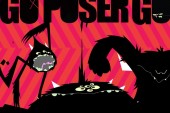
Canada has been making games, really great games, for quite a while now: Assassin’s Creed, Mass Effect, Dragon Age, Deus Ex, Far Cry (not to mention the countless indie games that have been produced here). If Japan was the AAA video game making kingpin of the 90s, Canada has quickly dominated the market in the new millennium. Vancouver and Montreal have long been considered the main gaming hubs up here, but now Toronto is looking to put itself on the map. The Government of Ontartio has offered more and more grants for new media over the past few years, hoping to bring this growing industry here.
Ubisoft, one of Canada’s biggest and most successful homegrown studios (The Assassin’s Creed series is one of the top selling franchises in the world right now), made the decision to open a Toronto studio in 2009. Located in the heart of the Junction Triangle, in the old 1923 GE factory, the staff at Ubisoft Toronto were given the task of creating the new title for the Splinter Cell series, one of Ubisoft’s flagship titles. Splinter Cell is a stealth action title that follows the adventure of black operative Sam Fisher in the fictional NSA division called Third Echelon. The fruits of their efforts, Splinter Cell: Blacklist, will be released today, and has already gone gold, as well as received a swath of four and five-star reviews. The woman behind it all is Managing Director Jade Raymond, an almost 10-year Ubisoft veteran who has a number of hit titles under her belt, including the first two Assassin’s Creed games.
Why did you decide you wanted to be in the game industry? Was there any particular moment or game when you said to yourself, ‘This is what I need to do?’
Yeah, absolutely. When you’re a kid a lot of people ask what you want to be when you grow up, and you start thinking about that when you’re relatively young, because so many people are asking you, and you figure you’ve got to find an answer to it. So I did spend a lot of time trying to figure it out. I loved science and math, and art and math were always my two favourite subjects, and I wanted to find something that combined the two. The only thing people kept bringing up was architecture, but then when I would speak to architects they would always say to me, “You don’t want to be an architect.” So I tried to find something else, and one day I was playing games with my uncle and trying to beat him, and it suddenly occurred to me that someone must make these, and it’s a good mix of art and science, and that’s when I sort of had this epiphany that this could be what I’d been looking for. And I’d already been working with computers at this point, building robots, and using Logo to program them to do all sorts of things, so I was already quite into programming in my spare time, and it made a lot of sense.
One of the first big games you worked on with Ubisoft was the first Assassin’s Creed, which is now one of the most profitable game franchises in the world. Did you know when you were making it that it would be as big of a hit as it’s become?
For sure it has surpassed expectations. We definitely set our sights high, and were aiming to create a franchise from day one. Not everyone gets the opportunity to create a brand new IP, and I wanted to make sure we were thinking of it in terms of an actual franchise that would make sense, so we did invest a lot of time when we were building the first game thinking about what could be a good meta story that can unroll throughout the franchise. What’s a good story arc and infrastructure that will allow us to make lots of different kinds of mediums and give other people creative freedom to do their own thing. So we came up with the present, and the idea that there would be these different time periods, with assassinations. The franchise is ultimately about the assassins throughout history and pivotal moments in history and the assassins that were there. And we spent a lot of time thinking about that, but we still kind of in our wildest dreams only thought, “OK, we’ll get to make three games, and maybe some books and some graphic novels.” We certainly weren’t thinking that it would be this huge thing that it is now.
Did you enjoy the challenge of making a new IP? Because I know with a big studio it’s not often you get to work on one, since it’s such a huge financial risk.
I always like big challenges, actually. I figure, if you’re not trying to do the most amazing new thing that’s never been done before, it’s not really worth doing. But it is always a lot more work and a lot more pressure. It’s funny, because now Assassin’s is the biggest brand at Ubisoft, so people forget what it’s like when you’re doing a new IP. Assassin’s was not Assassin’s as it’s known now when we were working on it, and I used to have to try and convince the marketing people to put the marketing budget behind it, and they’d be like, “Well, it’s a new IP, we don’t know how much it’s going to sell,” so I’d be like, “No, it’s going to be huge!” I had to try and sell it both internally and externally. Even getting people within the studio to want to work on it, because your bonuses are based on sales and stuff like that, involved a big sell. You have to tell everyone it’s a big deal, and it’s going to shift a lot, and then when it comes time to ship, you’re like, “Oh crap, I just made a lot of promises to a lot of people, this better deliver!” [Laughs] So yeah, it’s a lot of work, and very exciting, and it’s what I like doing, but it’s for sure stressful.
When you were moved here to work on Splinter Cell, were you at all worried about messing it up? Because I know the Splinter Cell fandom can be quite intense.
The discussion about bringing Splinter Cell to Toronto was done while I was still in Montreal, so it was a decision that was made along with Yannis [Mallat, CEO of Ubisoft Montreal] and Eve, and as a result of talking to Splinter Cell’s core team and making sure they were interested in moving. So it was kind of a long process of figuring out which franchise and who was going to come along and get the studio up and running, and getting them on board. I’ve always been incredibly excited about the Splinter Cell franchise, because I do like action games, and games like Splinter Cell, but I’m not one for “Army Games” that are just straight shooters where you’re just some guy in the military. I just can’t connect with that. But the idea of being a spy is really sexy to me, and I love Mission Impossible, and Bourne, and 24, and all of that. So I have always been really excited about Splinter Cell as a franchise because I’ve always thought it has so much potential and I really think the spy fantasy is one of the coolest ones you can have in a video game. I didn’t really realize when we first set out how hardcore and passionate the fans of the series are. I didn’t really understand that at first, so that’s been kind of a learning experience for me.
What does a typical day for you look like as the head of a fairly large game studio?
I come in in the morning, I sit down in this office, and I only get up to go for bathroom breaks! [Laughs] But more seriously, it’s pretty varied. My job is working primarily with the development team, since my background is mostly in production, so I really spend a lot of time hearing what the teams are working on, coaching them, answering certain questions, for example if the producers have questions about their team structure and how they’re thinking of setting it up; or from a creative direction standpoint; or a marketing standpoint, how do we align what we’re doing with the trends, things like that. So, I spend a lot of time working with the content team, but I also spend a lot of time on HR, on financial review, and even things like updating all our systems for next gen. It’s probably about 80 per cent development, and 20 per centadministrative. It’s definitely been skewed more towards the dev side lately, especially since I’m in the dual role of managing director of the studio and executive producer of the Splinter Cell franchise, so I’ve been even more involved, like I’m working with the producer who’s working on the graphic novel, I’m working on the brand bible, I’ve been doing work on the film, and I’ve been working with the producer of the novel and the mobile games. I’m really the person who has to pull all these elements together into a strong, cohesive franchise.
That’s really cool that you’re so involved in all aspects of the franchise, not just the video game part. It must keep things very interesting! Is the Splinter Cell movie going to be very much in Ubisoft’s hands as well, since the Assassin’s Creed movie is?
Yeah, it’s basically the same thing with Splinter Cell. We have a group called Ubisoft Motion Pictures, and they’re people from the film industry who have all the expertise in that area, and what we’re doing is structuring partnerships with the big film studios, where we’re contributing at least 50 per cent of the budget so we can maintain at least 50 per cent of the control.
Switching gears a little bit here. The game industry is known for a lot of long hours, and crunching, and it’s a lot of work and effort. I know you have a family. Do you ever find it difficult to manage your home life with your work in the studio, since women have such high expectations to be both the perfect Mom and the perfect employee?
Definitely. You have to become ruthlessly efficient, and cut out a lot of stuff. It means sacrifices, and it’s tough, because having kids really does change your priorities. I’ve always been someone who loved my job, and never watched the time pass. My whole career I’ve been at work until 11p.m. or midnight because I loved what I was doing, and I loved who I was working with, and I always just wanted to work more — it was my passion. And you don’t expect it, but your kids become a passion too — you really want to spend all your time with them. So then you have these two things you want to spend all your time doing, but you only have one you. I do feel like I’m not doing everything I’d like to at work anymore, and I do feel I’m not doing as much as I’d like with the kids as well. And then of course there’s everything else — free time with my husband, or time with my friends, and people are like, “What book are you reading?” and I’m like, “When do I have time to read a book anymore?” This would have been ridiculous to me before, because I used to read a ton. I do think it’s doable, and you do have to set limits, but it’s for sure always a kind of struggle.
How do you feel about all the recent conversations about sexism in the industry, both in games themselves and in the industry?
I haven’t really followed all those discussions as much, so I can’t comment on specifics. But I definitely think we have a ways to go in the games industry, as we do in many industries. I’m on the board of Women in Film and Television, and the glass ceiling is something women in all media are talking about. It’s something that I care enough about that I’m willing to volunteer my free time to being on the board and trying to figure out how we can encourage more women and get more women to a better place in this industry. I definitely think we have more work to do in a lot of industries, and media and games are definitely one of them. But at the same time, I’d like to see us make improvements by being positive about it, and I think I’m lucky enough to be in a position where I can make a positive impact. Here at Ubisoft Toronto, half of the leadership team is women, and we don’t have any specific hiring policy where we’re looking to hire a lot of women, but you find that there are a lot of really talented women applying for the job, and we will snap them up if they’re qualified. I also believe that by going out and doing interviews and talking to people you can really encourage other women to get in the industry. I think it’s changing and it’s improving, but I don’t really see the point of getting on some bandwagon and complaining, it’s better to do something about it.
So you mentioned the fact that 50 per cent of the management here at Ubisoft Toronto is women, and it was mentioned to me earlier that about 20 per cent of the staff as a whole are women, which is way, way higher than the industry average — did that have a big impact on Anna GrÃmsdóttir’s new look in Blacklist? Because I noticed she’s not “video game sexy,” she’s more normal girl sexy, which made me pretty happy.
No, I didn’t have any impact on any of that, although I did have some input on her first hairstyle. I was like, “That is too ornate, no woman who is working is going to spend that much time on her hair when she’s on a plane!” [Laughs] So I did have a little input there, but the rest of her design is thanks to men on the team, so I guess they also appreciate that kind of more believable sexy woman.
Do you think that Toronto is a good city to make games in?
I do, yeah. It’s a great city. I love Toronto because it’s a cultural melting pot, and it really makes me happy to walk around the studio and see so many people from so many diverse backgrounds. We’ve talked about women a lot, but I think the key to making exciting entertainment is by working with people with diverse backgrounds, who have their own perspectives and things to contribute, and you really have that in Toronto. Obviously there are great schools and support of the entertainment industry, but that’s what really makes me happy, that we can recreate Toronto’s diversity in our studio to make really great games.
Do you think that Toronto will one day become as big as Montreal and Vancouver in terms of making games here?
I think that’s the hope, to really invest in the market here. That’s one of the great things we have is support from the Ontario government. They’re really excited about all these high paying jobs targeted at young people, in a growth segment, so they’re trying to recreate the same kind of thing here in new media.
I read that you are working on a lot of new projects now that Splinter Cell is wrapping up. I think I heard five! Are you able to tell me what you’re working on now?
Well, we haven’t announced anything yet. All we’re saying right now is that we are collaborating on the Assassin’s Creed brand, and we’re also working on some new IP.
Is Ubisoft Toronto working on anything for next gen? Are you excited about the new consoles that are coming out?
Absolutely. Everything we’re working on right now is next gen, actually. We’re also the first studio that’s really focusing on making HD games.
What do you see for the future of the Toronto branch?
We have an objective to employ 800 people, which would fill up this building, so concretely we’re continuing our path to becoming a big studio. I really want us to have a mark on the industry in terms of innovation and bringing new types of games to the industry that surprise people, that’s what I hope we become known for.
____
Megan Patterson is a freelance writer and the Science and Technology Editor at feminist geekery site Paper Droids. She also tweets more than is healthy or wise.
For more, follow us on Twitter at @torontostandard and subscribe to our Newsletter.














